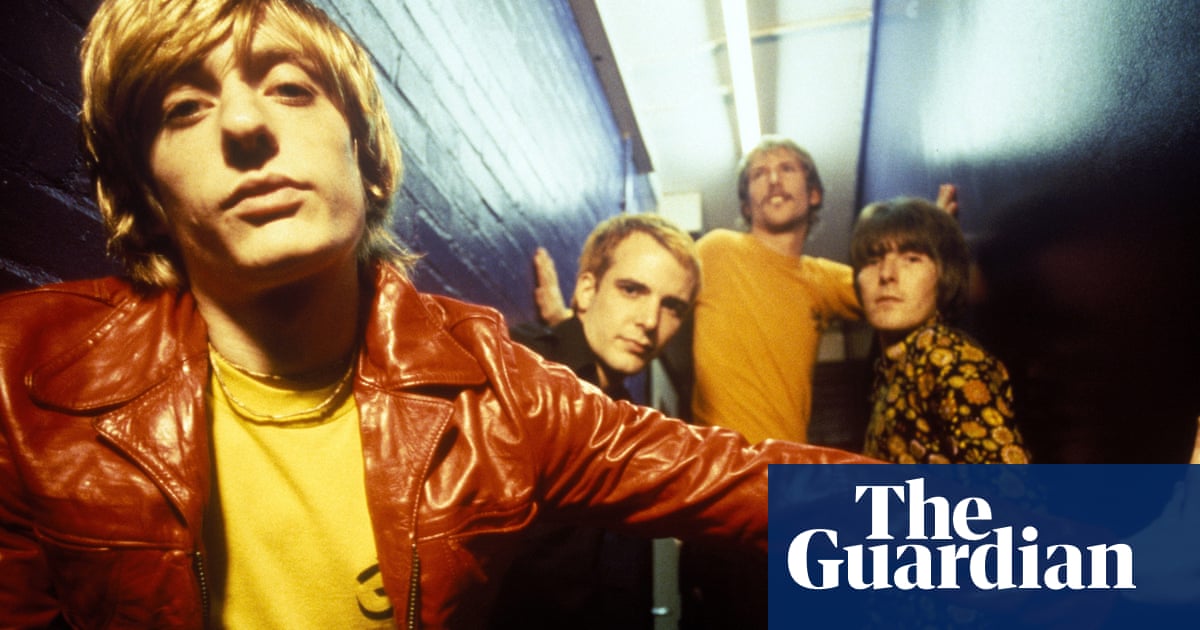It’s not our song; it’s as old as the hills. The first time I heard it was in a Krishna temple as a kid. George Harrison was the first person I know of who recorded it – it’s the last track on 1971’sThe Radha Krsna Temple album. We were all living together as a band in Swiss Cottage, London, and that record got played all the time. So I had it absorbed.
The first time we played our version was at Glastonbury festival in 1993. We’d smuggled ourselves in, in the back of somebody’s van, then blagged our way on to the stage in the Hare Krishna free food tent, which seemed appropriate. The arrangement with the droning chords and the chant in the middle pretty much happened on the spot. We continued to play it every night at every show for two years until we got a proper record deal.
It’s one of those songs that continues to evolve and surprise you however many times you play it. It’s not just a song. It’s a doorway into thousands of years of tradition, woven with philosophy, ontology and history encapsulating the promise of spiritual adventure.
We’re still discovering things now, because of the song’s origins. You have to have a mood of service towards it because it belongs to the world. It’s one of those songs where the band are getting as much benefit as the audience.
As for the lyrics: Sanskrit is often called “the language of the gods”. Why on earth would you not want to try that in a pop song? Govinda is one of the “intimate” names of God, which translates as “reservoir of pleasure”. On the whole, any of the names with the prefix “Go” (meaning “cow”), like Gopal or Govinda, glorifies Sri Krishna’s youthful time as the divine cowherd, who protects the cows, plays his magic flutes in enchanted forests and steals the hearts of heavenly milk-maidens.
It always got a reaction live. There was never a beige response. One of the turning points was when we were touring our debut album, K, to a sold-out show in Blackburn in front of 2,500 people in various states of intoxication with their arms in the air, singing this ancient spiritual folk song. I thought to myself: “God, we’re not in control of this, are we? This has got a life of its own.” It was the perfect, miraculous convergence of sublime and ridiculousness, and that’s what pop music should be.
We were playing around the north London Camden scene but also going out to the West Country and playing to a very different, often very hippy crowd. Our drummer is from near Glastonbury, so if we could play Glastonbury Assembly Rooms alongside some psychedelic sitar player, we’d jump at the opportunity.
We’d always loved the hippy music of the 60s and 70s, and had been equally fascinated by Indian classical music and eastern mysticism. A friend introduced us to the Bengali musicians who ended up playing on Govinda, who were a Hindu family from east London.
We worked with John Leckie, who had produced the first Stone Roses album and before that, this brilliant psychedelic record by the Dukes of the Stratosphear. The verse is repetitive but we’d been listening to the George Harrison version for months, so it was quite easy to get down. There’s lots of the tambura – the four-string sitar from Indian classical and folk music that gives the droning sound – and the tabla (the hand drums) all over the record. We had to remember that we were still these whitey westerners, laying down our groove.
It was great to get a song that’s entirely in Sanskrit on Radio 1, although I think most people saw it as one of those gimmicky songs. I remember people at early gigs shouting the lyrics as: “Go cash your gyro gyro.”
Some old songs you get tired of playing live, but Govinda always feels fresh, so we always finish live sets with it. It has a power that’s beyond us; we’re just the vessels. All we have to do is play and let the universe do the rest of the work.
Kula Shaker are performing atChalfest, Stroud, 18-19 July, andLakefest, Eastnor Castle, 6-10 August
